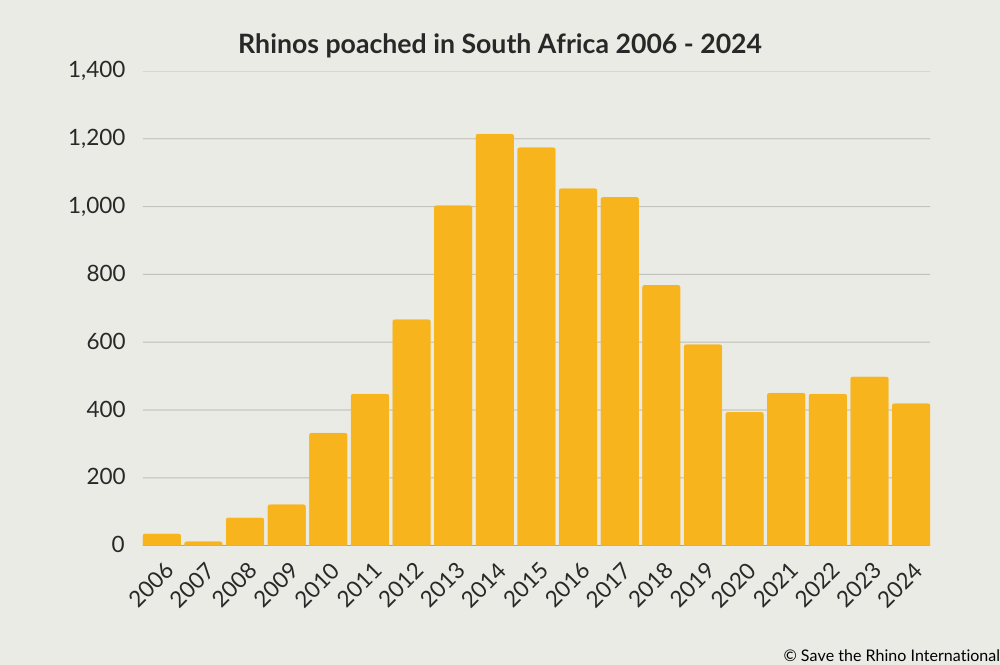Poaching Trends and Provincial Breakdown
According to DFFE Minister Dion George, "A total of 420 rhinos were poached across South Africa from 1 January to 31 December 2024. This represents a decrease of 79 animals from the previous year. The decrease is largely attributed to intensified anti-poaching measures, dehorning programs, and greater collaboration with law enforcement."
 |
| Credit: Save the Rhino International |
KwaZulu-Natal (KZN) Remains a Poaching Hotspot
KwaZulu-Natal (KZN) has been the hardest-hit province, accounting for 232 of the 420 poached rhinos in 2024. However, this number marks an improvement from the staggering 325 rhinos lost in 2023. The province’s success in reducing poaching is largely credited to the Ezemvelo KZN Wildlife Dehorning Programme, which ran from April to October 2024 in Hluhluwe-iMfolozi Park (HiP).
WWF South Africa, which supported the dehorning program, stated: "This initiative was a game-changer in deterring poachers. Between April and September, we saw a significant decline in poaching incidents, from an average of 35 cases per month to fewer than 10."
However, poachers adapted their tactics and began targeting dehorned rhinos. "In October alone, 27 rhinos were lost despite ongoing protection efforts," said a provincial anti-rhino poaching task force spokesperson. "The sudden increase was alarming, but swift responses and improved intelligence helped mitigate further losses."
 |
| Credit: Save the Rhino International |
Kruger National Park Sees an Uptick in Poaching
While KwaZulu-Natal showed a decline, Kruger National Park (KNP) recorded an increase in rhino poaching. A total of 88 rhinos were killed in 2024, compared to 78 in 2023.
"We managed to keep poaching under control for most of the year, but there was a sharp increase in December, with 21 rhinos poached," reported a Kruger National Park official. "This trend continued into January 2025, with an additional 17 rhinos lost. We believe this is linked to shifting poaching networks responding to tighter security in other areas."
Ongoing Anti-Poaching Efforts
Increased Security Measures and International Cooperation
The South African government has ramped up efforts to combat rhino poaching through enhanced security and greater international collaboration. Minister Creecy emphasized, "Our partnerships with law enforcement agencies in transit and destination countries for illegal rhino horn trade remain critical in disrupting these criminal networks."
A notable success in 2024 was the increased number of arrests and prosecutions of poaching syndicates. "More than 80 individuals involved in rhino poaching were arrested last year," reported a DFFE statement. "This demonstrates our commitment to holding criminals accountable and dismantling illegal wildlife trade operations."
Community Involvement in Conservation
In addition to security measures, conservationists stress the importance of community engagement in reducing poaching. "Local communities play a crucial role in protecting rhinos," said a spokesperson for the Rhino Conservation Trust. "Providing alternative economic opportunities, education, and incentives for conservation will help shift the narrative away from illegal poaching."
Looking Ahead: The Future of Rhino Protection
While the decline in poaching numbers is encouraging, the persistent threat from organized crime syndicates remains a major concern. Conservationists urge continued investment in anti-poaching technologies, community-based conservation, and legislative efforts to curb illegal wildlife trade.
"We cannot afford to become complacent," warned a senior ranger at Kruger National Park. "Every rhino life lost is a blow to conservation, and we must stay ahead of poachers who constantly evolve their tactics."
South Africa remains at the center of global rhino conservation efforts, and while 2024 saw progress, the fight is far from over. Only through sustained commitment and international cooperation can we ensure the survival of these iconic animals for future generations.
Awaiting Further Updates from the DFFE
As part of our commitment to providing accurate and up-to-date information, we have submitted further inquiries to the Department of Forestry, Fisheries, and the Environment (DFFE) regarding specific anti-poaching measures and future conservation strategies. We are currently awaiting their response, and this article will be updated as soon as more details become available.
UPDATE: Their official response can be found here

Comments
Post a Comment